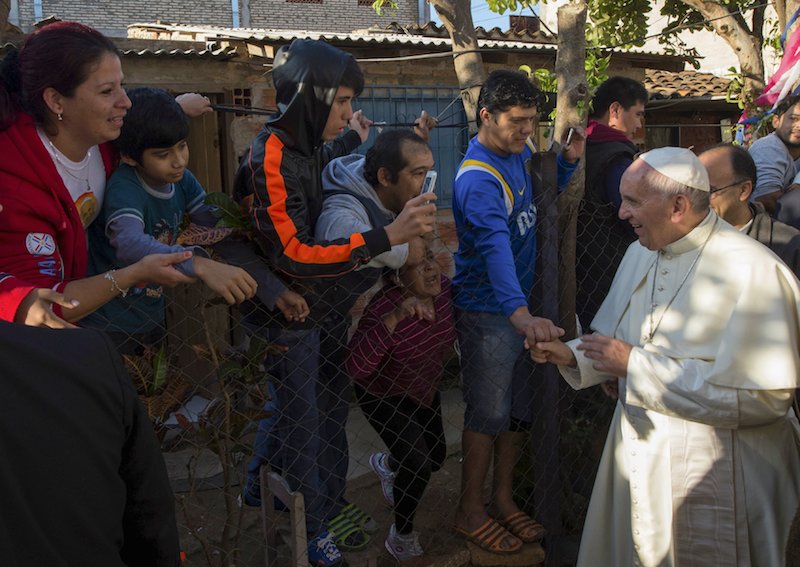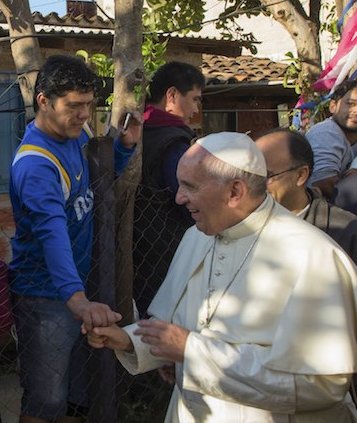
Pope Francis is greeted by a faithful during his visit to the Banado Norte neighborhood in Asuncion, Paraguay, on July 12, 2015. Photo courtesy of REUTERS/Osservatore Romano
ASUNCION (Reuters) Pope Francis, wrapping up his three-country tour of South America, on Sunday urged people living in a flood-prone shantytown in Paraguay to stay united in their struggle for better living and working conditions.
Francis looked moved as he heard harrowing tales of life in Banado Norte, a warren of shacks not far from downtown Asuncion that are home to about 100,000 people, many of whom are squatting on city land after being forced from their farms.
“Our expulsion from the countryside, the high prices of land and housing in the city, coupled with low incomes … are the reasons we find ourselves in the ‘Banado’,” Maria Garcia, a local organizer, told him from a platform before thousands of fellow residents. All of them want title deeds to their homes.
Francis drew cheers when he said he could not leave Paraguay without first “spending some time with you, here on your land”.
The Argentine pontiff has made defending the poor a major theme of his “homecoming” trip, which also took him to Ecuador and Bolivia, ranked among Latin America’s poorest countries.
On Saturday night, he appealed to world leaders to seek a new economic model to help the destitute, and to shun policies that “sacrifice human lives on the altar of money and profit”.
In Banado Norte, murals adorned the walls of houses made of corrugated metal, wood and cement blocks. One of them read: “Yes to life, no to drugs, fight for change.”
“We built our neighbourhoods inch by inch, overcoming difficult terrain, floods and hostile public authorities,” Garcia told him. “It’s been a tough fight to put up a home in the midst of hardship, but we never gave in nor let ourselves be swept away by sadness.”
The pope, who prayed in a chapel in the slum, told them: “Keep going. Don’t let the devil divide you,” noting that “a faith without solidarity is a dead faith”. At the end of his visit he asked them say the Lord’s Prayer in the Guarani language.
Francis regularly entered slums in Buenos Aires, the Argentine capital, when he was archbishop and has visited some of Rome’s poorer neighborhoods.
From Banado Norte, the pope went to hold a mass for more than a million people in a disused air base. Argentine President Cristina Fernandez flew in to attend the mass along with Paraguayan President Horacio Cartes.
On his trip, Francis has used two major speeches to excoriate unbridled capitalism and champion the rights of the poor. He has also warned of irreparable damage to the planet.
In Bolivia on Thursday, he urged the downtrodden to change the world economic order and called for the poor to have the “sacred rights” of labor, lodging and land.
On Saturday, he urged politicians and business leaders “not to yield to an economic model which is idolatrous, which needs to sacrifice human lives on the altar of money and profit”. Food and shelter were essential to human dignity, he said.
He said those charged with promoting economic development must ensure it had “a human face” and he blasted “the idolatry of money and the dictatorship of an impersonal economy lacking a truly human purpose”.
“Corruption is the plague, it’s the gangrene of society,” he said during a mostly improvised speech at Saturday’s rally, attended by Cartes.





